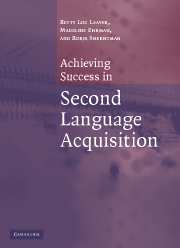Book contents
- Frontmatter
- Contents
- Notes on authors
- Acknowledgments
- Note to the reader
- Part I Learning
- 1 Planning foreign-language study
- 2 Understanding the role of cognition in the learning process
- 3 Learning styles and learning strategies
- 4 Understanding feelings and personality in language learning
- 5 Interpersonal dynamics in the learning process
- Part II Language
- Part III Independence
- Epilogue: from here to there: attaining near-native proficiency
- Appendix A Answers to “practicing what you have learned”
- Appendix B Learning strategies taxonomies
- References
- Index
2 - Understanding the role of cognition in the learning process
Published online by Cambridge University Press: 12 November 2009
- Frontmatter
- Contents
- Notes on authors
- Acknowledgments
- Note to the reader
- Part I Learning
- 1 Planning foreign-language study
- 2 Understanding the role of cognition in the learning process
- 3 Learning styles and learning strategies
- 4 Understanding feelings and personality in language learning
- 5 Interpersonal dynamics in the learning process
- Part II Language
- Part III Independence
- Epilogue: from here to there: attaining near-native proficiency
- Appendix A Answers to “practicing what you have learned”
- Appendix B Learning strategies taxonomies
- References
- Index
Summary
Preview
This chapter introduces you to the science of learning – in this case, as applied to learning foreign languages. While we do not yet know everything about how the brain processes foreign language and builds proficiency, much is known and much more is being discovered every day. Topics that this chapter will address include:
Cognition. Cognitive processes will differ, depending on whether this is your first, second, or third language. In any case, you will fare better in your language-learning activities if you understand such concepts as coding and encoding and the difference between knowledge and proficiency.
Memory. Memory has a number of components. These include sentient memory (or awareness), short-term memory, long-term memory, and working (or activated) memory. Activated memory is important for recognition, recall, and reconstruction of others' expressions and construction of our own (new) expressions. Good memory depends on memory strategies and body chemistry; both of these can be improved by learners.
Aptitude. Aptitude refers to the ability to learn a foreign language, much of which may be innate or at least developed over a long time. Some students just seem to learn languages more easily than other students. There are a number of components of aptitude, and even students with low aptitude can learn a foreign language by being aware of their strengths and knowing how to compensate for their weaknesses.
Metacognition. Metacognition is that which is “above” cognition. In other words, it is “thinking about thinking.” Being aware of one's own progress, actions, and thinking processes can do much to improve language-learning success.
- Type
- Chapter
- Information
- Achieving Success in Second Language Acquisition , pp. 38 - 64Publisher: Cambridge University PressPrint publication year: 2005

